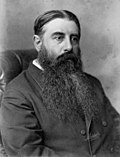A request that this article title be changed to 1873 Fox ministry is under discussion . Please do not move this article until the discussion is closed. |
The Fourth Fox Ministry was a responsible government which held power in New Zealand from March to April 1873. [1]








